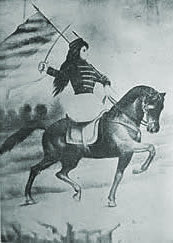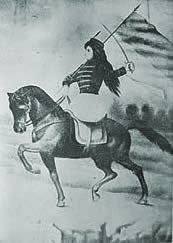
|
Women and Independence in Latin America An exploration of women's involvement in the Latin American Wars of Independence |

|

|
Women and Independence in Latin America An exploration of women's involvement in the Latin American Wars of Independence |

|
Click on the image below to see the full-size image
 Medals |
Gender:Male
Ethnic origen: Mulatto
Events:
| 1785 | - | Tucumán | - | Not applicable | - | He was born in Tucumán. |
| 1809 | - | Chile | - | Patriot | - | He joined the independence movement here. |
| 1811-1812 | - | Buenos Aires | - | Unknown | - | He contributed to Gaceta de Buenos Aires, founded El Mártir o Libre, and the Sociedad Patriótica. |
| 1819 | - | Mendoza | - | Unknown | - | He ordered the executions of Juan José and Luis Carrera in Mendoza in 1819. |
| 1821 | - | Lima | - | Unknown | - | He was head of the department of war. |
| 1821 | - | Lima | - | Unknown | - | He went to Peru with San Martín and founded the Sociedad Patriótica. |
| 1822 | - | Lima | - | Unknown | - | He founded the Sociedad Patriótica de Lima. |
| 1825 | - | Córdoba | - | Unknown | - | He studied at the University of Córdoba. |
| 1825 | - | Lima | - | Unknown | - | He was assassinated in San Juan de Dios de Lima, in 1825. |
Connections:
Editors newspapers and magazinesBiography:
Born in Tucumán, Argentina, in 1785. He was one of the leaders of Independence who went to Peru with San Martín and supported the monarchy in Peru. He founded the all-male Sociedad Patriótica de Lima (1822), its secretary was Francisco Javier Maríategui. Republicans formed a minority in it. El Sol del Perú was its organ of expression; it was published from March to June 1822. It closed as San Martín left Guayaquil and opposition against Monteagudo grew. He was an enemy of José Faustino Sánchez Carríon. He was assassinated in San Juan de Dios de Lima in 1825. (Romero de Valle, 214, 302; Martínez Riaza, 50-51)
The Carrera family was accused of his assassination. (Knaster, 504)
He wrote for the Lima publication El Pacificador del Perú in 1821 and began La Gaceta de Buenos Aires. Like San Martín, he was in favour of a united America. (Martínez Riaza, 46, 67.)
He is described by Lynch as close to San Martín, and pro-monarchy, but not popular with Peruvians. He was assassinated in Lima. (Lynch, xviii)
He was in favour of social equality and the rights of man. He founded the Sociedad Patriótica. His articles led to the closing down of La Gaceta, but Monteagudo then set up El Mártir o Libre. He eventually had to leave Buenos Aires, going to Chile where he joined the independence soldiers. In 1821 he was head of the department of War in Peru. He founded another Sociedad Patriotica in Lima. (Coester, 48-49)
He read and studied Voltaire, Rousseau, Raynal, Locke, Filangieri and others in Córdoba University. (Chiaramonte, 358)
Described by Clissold as a mulatto, "the evil genius of the revolution" who "combined in his person the destructive elements of the terrorist with utter ruthlessness in the pursuit of power and the indulgence of his own passions". He left a "trail of crime and assassinations" in Argentina, Chile and Peru. He ordered the executions of Juan José and Luis Carrera in 1819 to gain the favour of San Martín and O'Higgins while "satisfying his own sadistic lusts". (Clissold, 168)
References:
Assadorian, C.S., Beato, G., & Chiaramonte, J.C. Halperín-Donghi, Tulio (editor). (1972) Historia argentina, de la conquista a la independencia
Clissold, Stephen (1968) Bernardo O'Higgins and the Independence of Chile
Coester, Alfred (1919) The Literary History of Spanish America
Knaster, Meri (1977) Women in Spanish America: An Annotated Bibliography from Pre-Conquest to Contemporary Times
Lynch, John (1986) The Spanish American Revolutions 1808-1826
Martínez Riaza, Ascención (1985) La prensa doctrina en la independencia de Perú, 1811-1824
Romero de Valle, Emilia (1966) Diccionario manual de literatura peruana y materias afines